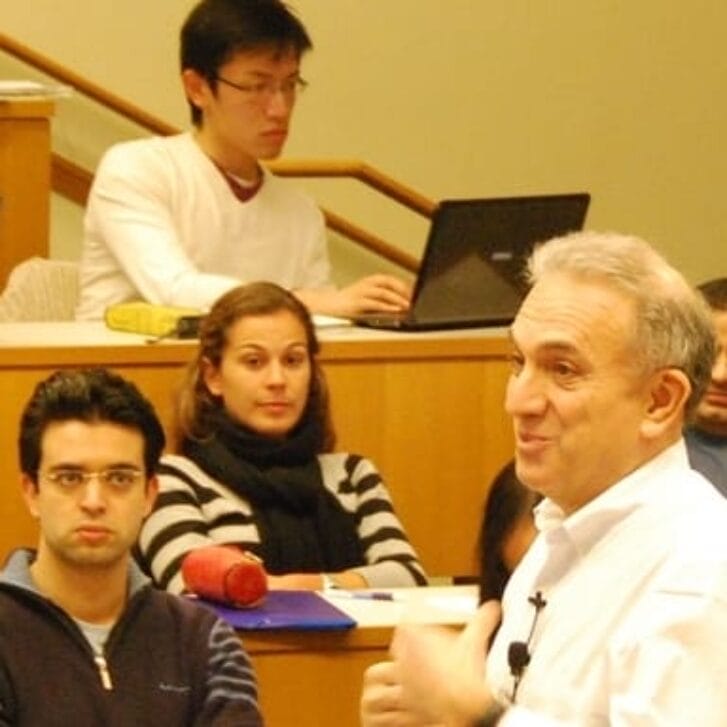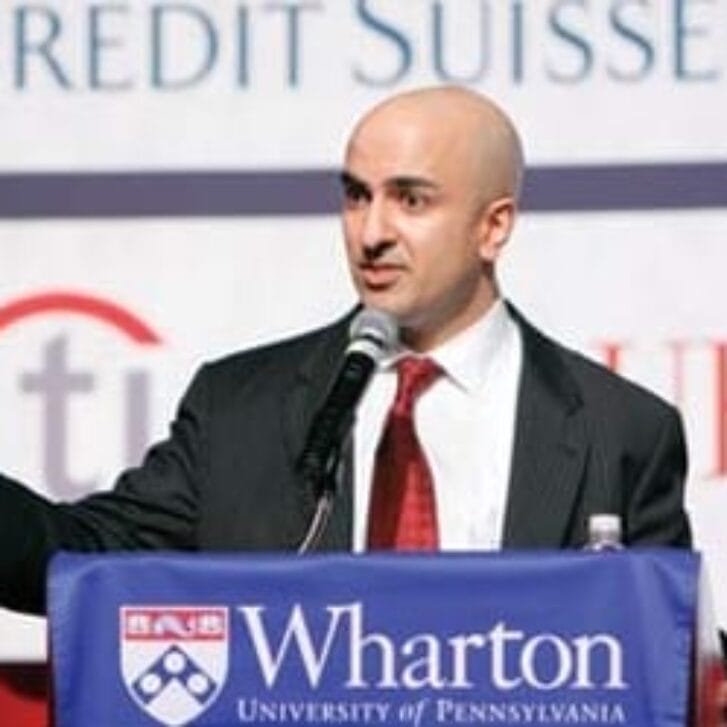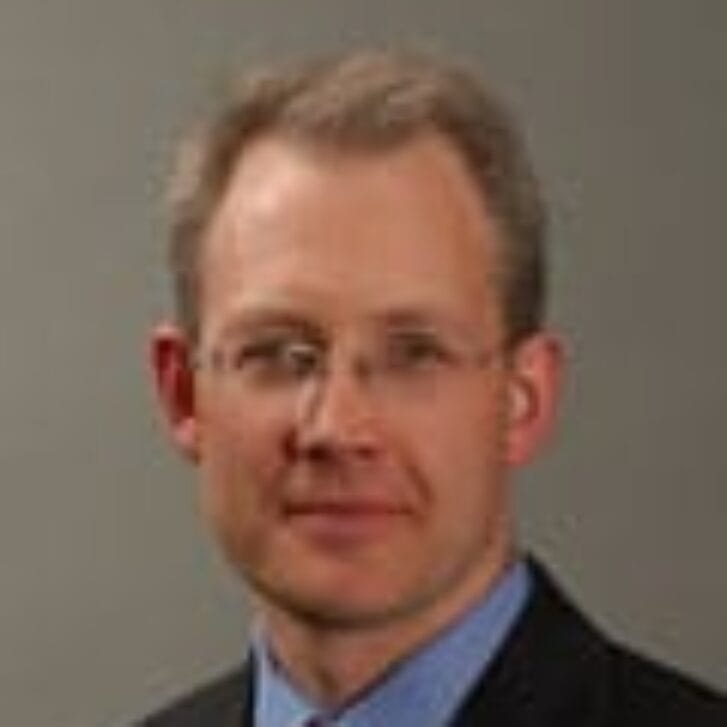Our series on alumni in different cities lands in London, described by one of the approximately 600 Wharton graduates there as the “most civilized city in the world.” It’s prosperous as well, as both city and country bounce back from a recession in the early 1990s to become one of the strongest economies in Europe. On March 28-29, London hosted the Wharton European Forum centered around the theme: “European Competitiveness: Dynamo or Dinosaur?” Speakers included Peter D. Sutherland, chairman of Goldman Sachs International and former director general of GATT and WTO, and the Hon. Raymond G.H. Seitz, managing director, Lehman Brothers International, and former U.S. Ambassador to the U.K. Visitors to London for business or sightseeing can dine at a restaurant owned by an alumnus, stay at a hotel owned by an alumnus, or buy a pair of shoes designed by an alumna. Read on for details.

Along with his other accomplishments, activities and honors, Paul Judge can now add a knighthood.
On February 20, Judge was knighted by Queen Elizabeth during a ceremony that recognized him “for public and political services.” Chief among those was his three-year position as director general of the Conservative Party from 1992 to 1995, a job which entailed looking after the Party organization, including campaigning, finances, research and communications.
 Since November 1995, he has been a ministerial adviser in the Cabinet Office responsible for maintaining England’s competitive position vis-a-vis world markets. Specifically, Judge advises the government on such issues as deregulation, information technology, and ensuring that Britain remains attractive to British and foreign investors. “Since the 1980s Britain has undergone a transformation in terms of its competitiveness,” says Judge, whose office is in Whitehall. “Already more than one-third of all investment into the European Union comes into the UK. It’s a matter of maintaining and enhancing that record.
Since November 1995, he has been a ministerial adviser in the Cabinet Office responsible for maintaining England’s competitive position vis-a-vis world markets. Specifically, Judge advises the government on such issues as deregulation, information technology, and ensuring that Britain remains attractive to British and foreign investors. “Since the 1980s Britain has undergone a transformation in terms of its competitiveness,” says Judge, whose office is in Whitehall. “Already more than one-third of all investment into the European Union comes into the UK. It’s a matter of maintaining and enhancing that record.
Judge is officially a “Knight Bachelor,” now known as Sir Paul Judge, and his wife, Anne Judge, WG’75, is officially “Lady Judge.” They have two sons, ages 10 and 11, and live in London and in a village near Worcester.
Born and raised in London, Judge attended St. Dunstan’s College and Trinity College, Cambridge, before coming to Wharton as a Thouron Scholar. In 1973 he joined Cadbury Schweppes as a financial analyst. He was promoted to deputy finance director in 1977 and to group planning director and member of the Group Executive Committee in 1984. In 1985 he initiated the management buy-out of the UK, French and Irish food interests of Cadbury Schweppes to form Premier Brands, of which he became chairman. At $150 million, it was the largest buy-out in the UK in 1986 and is still the largest ever in the UK food manufacturing industry.
The company was sold to Hillsdown Holdings in 1989 for $500 million, at which point Judge stepped down as chairman.
In addition to serving on the boards of numerous companies, foundations and schools, Judge is an entrepreneur. He is chairman and major shareholder of Isoworth Ltd., which has a patent on a device that easily carbonates water and can therefore be incorporated into machines dispensing high quality soda and beer from syrup. “It’s more economical because you can use the water that is already in your house or office, and it’s environmentally better because you save more than 80 percent of the packaging as you do not have to ship all that water in bottles or cans from a central factory,” says Judge. His other major investment is in Belgo, a Belgian-style restaurant that was just named “Restaurant of the Year” by Time Out, London’s main weekly listings magazine.
As someone who is an active participant in both the government of Britain and its economy, Judge sees a prosperous 1996 ahead for consumers. “We had the highest growth rate of all the major European countries in 1993, 1994 and 1995, with especially strong manufacturing and export sectors. But because of tax increases in 1992 and 1993, not all of that prosperity has shown up yet in consumers’ pockets. This year economic growth is continuing and we’ve reduced taxes, which should mean significant increases in the standard of living.
Two months ago, Mr. Holland’s Opus was the number one movie in America. Although the film was produced by Interscope Communications, which is owned by Polygram NV, Alain Levy wasn’t entirely satisfied. “Movies are only 13 to 14 percent of our sales,” says Polygram’s president and CEO. “They should be 25 percent. But we have a strategy to achieve that without necessarily going for a major studio.”
 On the movie side, “we are operating a bit like we operate in the record business, which is to have separate labels,” says Levy, who heads one of the fastest-growing entertainment companies in the world. “You never see Polygram on a recording. You see Motown or A&M Records or Deutsche Grammophon. Polygram is a distributor for all these creative units. We are doing the same thing in movies. Rather than have a studio chief who has all the production coming to him, we have independent labels who have their own creative units and who develop movies. The distribution system is the same for all the labels. A small budget movie, like Dead Man Walking for example, will be distributed by Gramercy, which we just bought back from Universal. For bigger movies we still are in a rent studio system where the studio distributes the film to hundreds of cinemas and gets a fee in return.”
On the movie side, “we are operating a bit like we operate in the record business, which is to have separate labels,” says Levy, who heads one of the fastest-growing entertainment companies in the world. “You never see Polygram on a recording. You see Motown or A&M Records or Deutsche Grammophon. Polygram is a distributor for all these creative units. We are doing the same thing in movies. Rather than have a studio chief who has all the production coming to him, we have independent labels who have their own creative units and who develop movies. The distribution system is the same for all the labels. A small budget movie, like Dead Man Walking for example, will be distributed by Gramercy, which we just bought back from Universal. For bigger movies we still are in a rent studio system where the studio distributes the film to hundreds of cinemas and gets a fee in return.”
Whatever its strategy, Polygram NV, which is 75 percent owned by Philips Electronics NV, is a huge success story. The company recently posted its eighth year of uninterrupted sales and profits, in spite of a slow second half in 1995. Sales were up 11.2 percent, from $4.9 billion in 1994 to $5.5 billion in 1995, while net income grew by 9.2 percent, from $424 million to $463 million.
On the movie side, Polygram has already spent approximately $400 million to acquire its small production companies, whose hits have ranged from Four Weddings and a Funeral and Usual Suspects to French Kiss and Priscilla, Queen of the Desert. The company recently renewed its agreement with Jodie Foster’s Egg pictures for three more years.
On the music side, Polygram currently has a 14.4 percent share of the American music market — second only to Time Warner’s music division — and an enviable marketing and distribution network in Europe and Asia. In September, Polygram formed a 50/50 joint venture with the estate of Leonard Bernstein to publish his works.
Levy himself is highly regarded for his ability to recognize and attract both new and old talent, including The Cranberries, Sting, Elton John, Boyz II Men, Janet Jackson, Adagio Karajan and Luciano Pavarotti.
These days, however, Levy spends “more time with financial analysts than artists. The real issue is making sure you find the best people. These are my heads of labels who have the same philosophy I do and who are very good at discovering and nurturing talent. My role now is more one of a coach and a finder of executives than doing actual grass roots work.”
Levy, who is French and graduated from the École Des Mines in Nancy, has three sons from previous marriages and is currently married to a lawyer who also works at Polygram. He became chief executive of Polygram’s United States operations in January 1990 and head of the whole company in 1991. Before joining Polygram in 1984, Levy worked for CBS Records in the U.S. and Europe.
“If we manage our growth into the movie business and continue to increase our TV production as well,” says Levy, “we should have a sizable part of the content needed to be an entertainment package.”

In an article published last summer in the magazine Directors & Boards, Henry Sweetbaum argues that “burdening the [corporate governance] system with excessive and possibly ineffective controls” is counterproductive, and worse, damaging to the whole concept of free enterprise. Instead, he says, offer incentive packages that allow CEOs to attract high-quality outside directors who will act in the best interests of the company and its stakeholders.
During a recent interview, Sweetbaum identified three distinct kinds of companies. “First, there are well-managed companies with strong boards and excellent corporate governance. These companies clearly do not benefit from additional regulations. Second, there are small- to medium-sized companies led by well-intentioned but perhaps inexperienced management, often unable to attract highly qualified non-executive directors. To ensure a high standard of corporate governance, these companies require education, training and the means to attract quality directors, not additional regulation. Third, there are companies led by ‘rogue managers’ who are not prepared ‘to do the right thing.’ History tells us that these people ignore the rules in any event.
 “What concerns me,” says Sweetbaum, “is that we are reaching a point — often discussed in America and increasingly heard in Europe — where there is litte joy in running a public company, given all the criticism, liability risks and press attention that surround it. That doesn’t seem right.”
“What concerns me,” says Sweetbaum, “is that we are reaching a point — often discussed in America and increasingly heard in Europe — where there is litte joy in running a public company, given all the criticism, liability risks and press attention that surround it. That doesn’t seem right.”
Sweetbaum is quick to say that his own board is excellent and has served the company well. Wickes plc, one of Europe’s leading home improvement retailers, has 150 stores throughout the world, revenues in 1994 of $1.1 billion and pre-tax profits of $45 million. In 1995, in addition to selling off its troubled timber interests, Wickes opened 16 stores in the UK, three stores on the continent and its first two stores in South Africa (as part of a joint venture with Barlow Limited, one of South Africa’s largest industrial companies.) In 1996, 20 more stores are opening in the UK, five on the continent and six in South Africa. “With the emerging South African consumer and the enormous need for housing, the opportunity for businesses like Wickes are enormous,” says Sweetbaum, whose move represents one of the first ventures by a British retailer into the South African market.
Sweetbaum, who is married and has four children, has been chairman and CEO of Wickes since 1982. Prior to that, he assisted with a number of technology-based corporate rescues and equity transactions in both the U.S. and Europe. He participated in the rescue of Wickes Companies Inc. in 1982, serving as chairman and CEO of Wickes International Corp. until 1987 when he led the management buyout of its successor, Wickes plc.
He is bullish about Britain, which he feels is “in the best shape in Europe from a cost and productivity perspective.” Germany, he says, has made great improvements in this area over the past two years while France “still needs to undergo the process of change … Given the strains of the past few months, there is no sign this will happen peacefully.”

Between the time she graduated from Wellelsey College and the time she attended Wharton, Mary Minowada worked in sales and trading at Morgan Stanley in New York.
 Today, she designs footwear, accessories and leather goods for Joan & David, a $115 million upscale shoe and clothing company with headquarters in New York and more than 43 boutiques around the world including flagship stores in Paris, London and Hong Kong.
Today, she designs footwear, accessories and leather goods for Joan & David, a $115 million upscale shoe and clothing company with headquarters in New York and more than 43 boutiques around the world including flagship stores in Paris, London and Hong Kong.
Quite a career change, Minowada acknowledges, although not as dramatic as it might seem. As a graduate of the Joseph H. Lauder Institute of Management and International Studies, Minowada was determined to use not just her management skills but also her languages (she speaks several) and cultural training.
In 1991 she was hired by the French designer Christian LaCroix in the area of retail and wholesale management. “It was a very entrepreneurial office — only three of us in New York,” says Minowada, who managed two retail stores in the New York area and worked with buyers at the New York and Paris fashion shows. “We were overworked and underpaid, but it was fun.”
After one year, she was lured away by Joan Halpern, chief executive and chief designer at Joan & David, to be “her right arm.” Although Minowada expected a management role, she ended up spending a lot of time in Italy watching her boss design. “One day, I said to her, ‘Do you want me to help out with the drawing?’ Her response was, ‘Oh, do you know how to draw? Great, and if you have any ideas, sketch them up.’” That was three years ago and today, Minowada is one of the company’s three designers.
She loves her job, but was prepared to leave Joan & David and move to England where her fiancé, Renaud Jezequel, WG’91, works for GE Capital. Instead, the company agreed to transfer her to London, location of three Joan & David stores. Even so, she is only home four to five months a year, dividing the rest of her time between Italy, where all the company’s designs are manufactured in preparation for four annual collections, and headquarters in New York.
The “unorthodox” approach of the company appeals to her, “in the way that we work and in the fact that we don’t make 10,000 pairs of one model,” says Minowada. “Instead of mass production, it is almost one-of-a-kind manufacturing.”

In 1991, BET plc was a “1980s conglomerate that had bought 170 companies in five years and was severely challenged by debt,” among other problems, notes John Clark.
Within four years, Clark had sold off or merged all but 55 of the companies, reduced the staff from 184,000 to below 100,000 (it is now about 130,000), paid off all debt and restructured the remaining businesses. Today, BET is a solidly profitable $3.6 billion company that provides specialized support services to business customers. These services range from electronic security, cleaning, plant hire, distribution, catering, personnel and temporary staffing to resort management, conference centers and facilities management in Europe and the U.S. Sales grew 10 percent last year and earnings were up 22 percent.
 Turning around a multibillion dollar or pound company usually takes three steps, says Clark, who has done this before. First is reorganization and restructuring (downsizing); second is a strong productivity phase, and third is customer focus.
Turning around a multibillion dollar or pound company usually takes three steps, says Clark, who has done this before. First is reorganization and restructuring (downsizing); second is a strong productivity phase, and third is customer focus.
Outsourcing expertise and experience play a large role in company strategy. BET’s innovative vision of outsourcing can mean, for example, “entering into a joint venture to run 50 percent of a retailer’s stores; building and running conference management centers for a multinational corporation over a 10-year period; or buying and operating the truck fleet of a major petrochemical company,” says Clark.
Meanwhile, he adds, “we have gone through the turnaround/restructuring/focus phase. Now is the enjoyable part — growing the business.”
BET is the third successful turnaround Clark has engineered over the past 15 years. After getting his MBA at Wharton, he joined the Singer Company. In 1981 he was appointed president and CEO of Singer’s Europe, African and Middle East operation. Within three years he had turned a $33 million net loss into net income of $60 million.
After two years as executive vice president at the VF Corp. where he repositioned product lines for the Lee, Vanity Fair and Wrangler brands, among others, he was appointed president, CEO and later chairman of Core-Mark International, Inc., a $2.4 billion consumer products marketing and distribution company which at the time had logged three consecutive years of losses. Clark restructured the business, increased its profitability and value and then sold it.
Clark was born in Eustis, Fla. He and his wife, Judith Dooley Clark, a 1963 Penn graduate, have two children.
He describes the UK as a “very advantageous place for low-cost export manufacturing in Europe, with a strong currency and low inflation.” On the other hand, he worries that “there is still too much capacity for the amount of demand. It means you have to be very competitive to exist here.”

It was the combination of unfilled need coupled with very depressed property values that got Michael von Grey into the hotel business back in 1992.
 When von Grey and his wife first moved to Hampstead, an upscale neighborhood about 15 minutes from downtown London, they were surprised to find that the area lacked a first-class hotel — so surprised that they bought a derelict Victorian building and within 18 months had it up and operating as a 17-room bed & breakfast. Sandringham Hotel was listed this year in the Michelin guide, plus two prestigious British publications called the Good Hotel Guide and Which? In addition, they were voted the only 5-star bed and breakfast establishment in London by the AA (the equivalent of the AAA in the U.S.)
When von Grey and his wife first moved to Hampstead, an upscale neighborhood about 15 minutes from downtown London, they were surprised to find that the area lacked a first-class hotel — so surprised that they bought a derelict Victorian building and within 18 months had it up and operating as a 17-room bed & breakfast. Sandringham Hotel was listed this year in the Michelin guide, plus two prestigious British publications called the Good Hotel Guide and Which? In addition, they were voted the only 5-star bed and breakfast establishment in London by the AA (the equivalent of the AAA in the U.S.)
Von Grey and his wife, who was working at the time as a management consultant with KPMG Peat Marwick but also has a fair amount of interior design experience, “actually lived on the property amidst all the rubble for nearly two years. Then last July we hired a professional management team and in September, moved into our own space,” says Von Grey. He and his wife, both of whom come from Pittsburgh, have one daughter and another child on the way.
The hotel is not von Grey’s first entrepreneurial undertaking. After graduating from Wharton, he spent four years in the U.S. Army, earned his MBA at Harvard, and then moved to London to start a computer software company focusing on automating the activities of hospital nursing departments.” He sold it in 1992 to a Houston firm called CHC.
Now, von Grey adds, his “entrepreneurial antennae are up again. I’m looking at Internet-based software opportunities, things like bartering over the Internet and electronic data exchange. But right now I’m still in the search mode.”

While studying finance and taking courses in operations and information management at Wharton, Bilge Ogut became fascinated by technology. She has translated that interest into a job as financial analyst in Goldman Sachs’ London office where she does corporate finance and M&A work for communications, media and technology companies.
 Her work takes her mainly to western Europe but also to eastern Europe where, for example, she advises mobile communication networks that are in their start-up phases on ways to finance their operations. She also works on privatizations for state-owned telecommunications companies. “By 1998, because of regulatory changes in Europe, all these companies will be privatized,” says Ogut. “At the same time, they are trying to defend their home market from other people interested in getting into the business. It’s a very competitive industry and it is changing extremely rapidly.”
Her work takes her mainly to western Europe but also to eastern Europe where, for example, she advises mobile communication networks that are in their start-up phases on ways to finance their operations. She also works on privatizations for state-owned telecommunications companies. “By 1998, because of regulatory changes in Europe, all these companies will be privatized,” says Ogut. “At the same time, they are trying to defend their home market from other people interested in getting into the business. It’s a very competitive industry and it is changing extremely rapidly.”
Ogut, who was born in Turkey and grew up in Istanbul, speaks German, Turkish and English and has a reading knowledge of French. She was a Benjamin Franklin Scholar at Wharton, graduated Phi Beta Kappa and earned a dual degree in German literature.
She wanted to work abroad because “Europe is so interactive. You travel two hours and you are in a totally different environment. Going from the Netherlands to Belgium is easier than going from New York City to Boston.” London, she says, “is a very early city. It starts early and ends early. In the States, everything is accessible all the time. Here you have to plan ahead, so in that sense life is a little inconvenient.
“Otherwise, London is a very culturally rich, very international city. You take the tube, for example, and everyone is reading Balzac and Victor Hugo. It’s very different from the New York subway system.”

Of all the major cities in the world, says Roger Low, “London is the most civilized. In addition to having a vibrant business community, it’s a very international society that is always open to new ideas.”
Low should know. He has lived there since 1972 and worked in the area of institutional equity sales for four different employers. In 1971 he had joined Burnham & Co. in New York City with the goal of being transferred overseas as soon as possible. An opening in the London office came up in 1972. Low stayed there until 1975, moving on to Salomon Brothers for seven years, and then Dean Witter for two years. He has been with Bear Stearns since 1984.
 The current year is a tricky one for investors, says Low, who provides advice on U.S. equities to UK clients, including pension funds, hedge funds and insurance companies, among others. “People’s expectations have risen after a year in which they saw returns of close to 37 percent. It’s difficult if people think they can earn that again this year. The average for decades has been about 10 percent annually. For 1996 it is likely to be on the low side of that.”
The current year is a tricky one for investors, says Low, who provides advice on U.S. equities to UK clients, including pension funds, hedge funds and insurance companies, among others. “People’s expectations have risen after a year in which they saw returns of close to 37 percent. It’s difficult if people think they can earn that again this year. The average for decades has been about 10 percent annually. For 1996 it is likely to be on the low side of that.”
Low thinks that stock selection will be more important in ‘96 than in ‘95 and that opportunities exist in small- and midcap stocks rather than large-cap stocks.
His clients have a certain percentage of their funds invested in U.S. equity markets at all times. He works with these clients to maximize the percentage. “On an asset allocation basis, they have been underweight in U.S. equities, which means they have missed the main run in the U.S. equity market,” he notes.
“The interesting thing about the securities business is that every day is different,” says Low, who works long hours because of the need to bridge the U.S. and UK equity markets. “All news has some impact on financial markets, so you can never be too well informed.”
Low notes that some of the competitors in his field are “top notch, including several Wharton graduates.” His clients include alumni as well: Among them are Peter de Putron, WG’92, Paul Midgley, WG’72, and Wesley Wadman, WG’60.
Low, who was born in Anniston, Ala., and graduated from Columbia College, is married and has two children, a son who graduated from Oxford and is now a radio journalist, and a daughter at Bristol University.


























